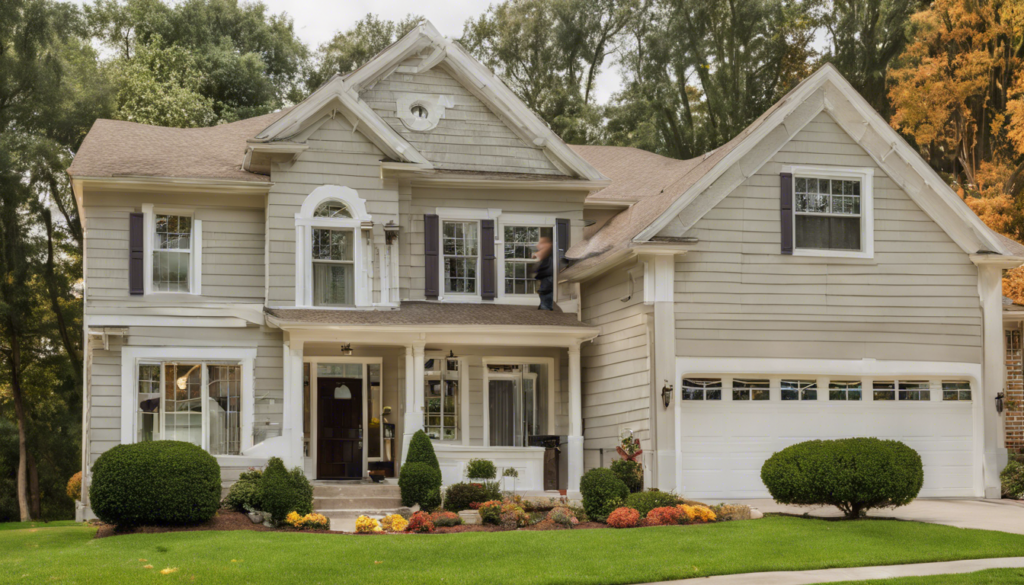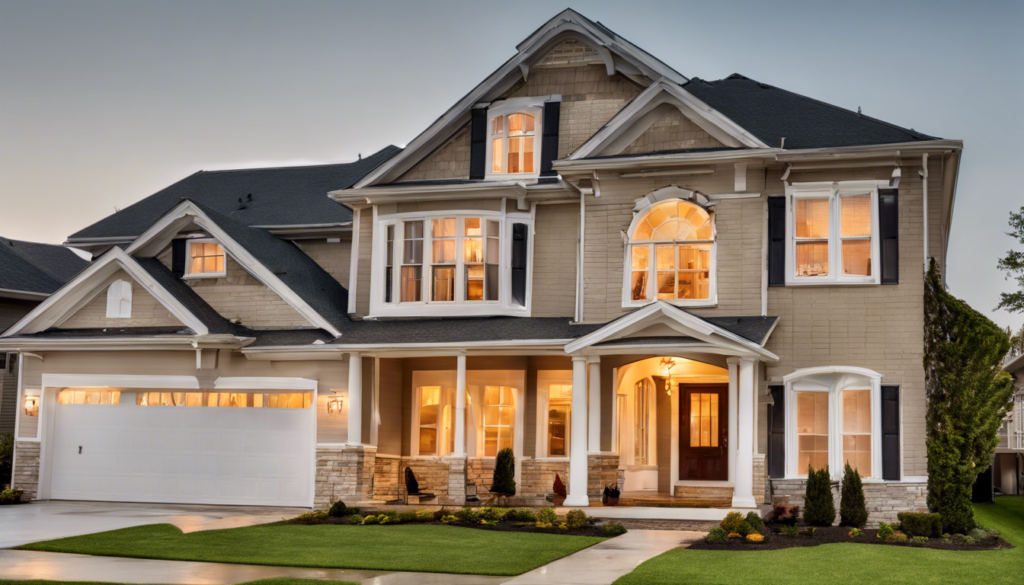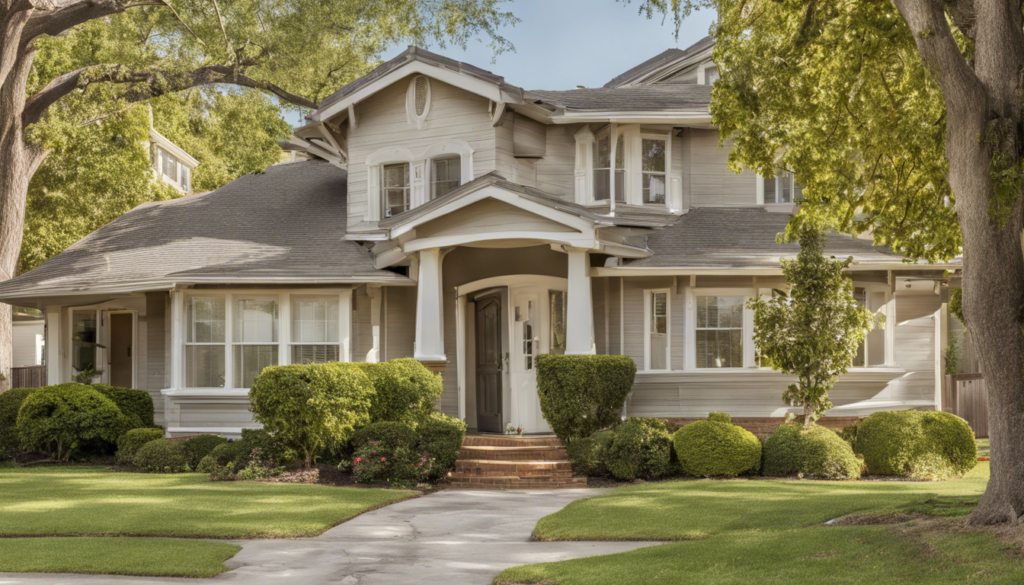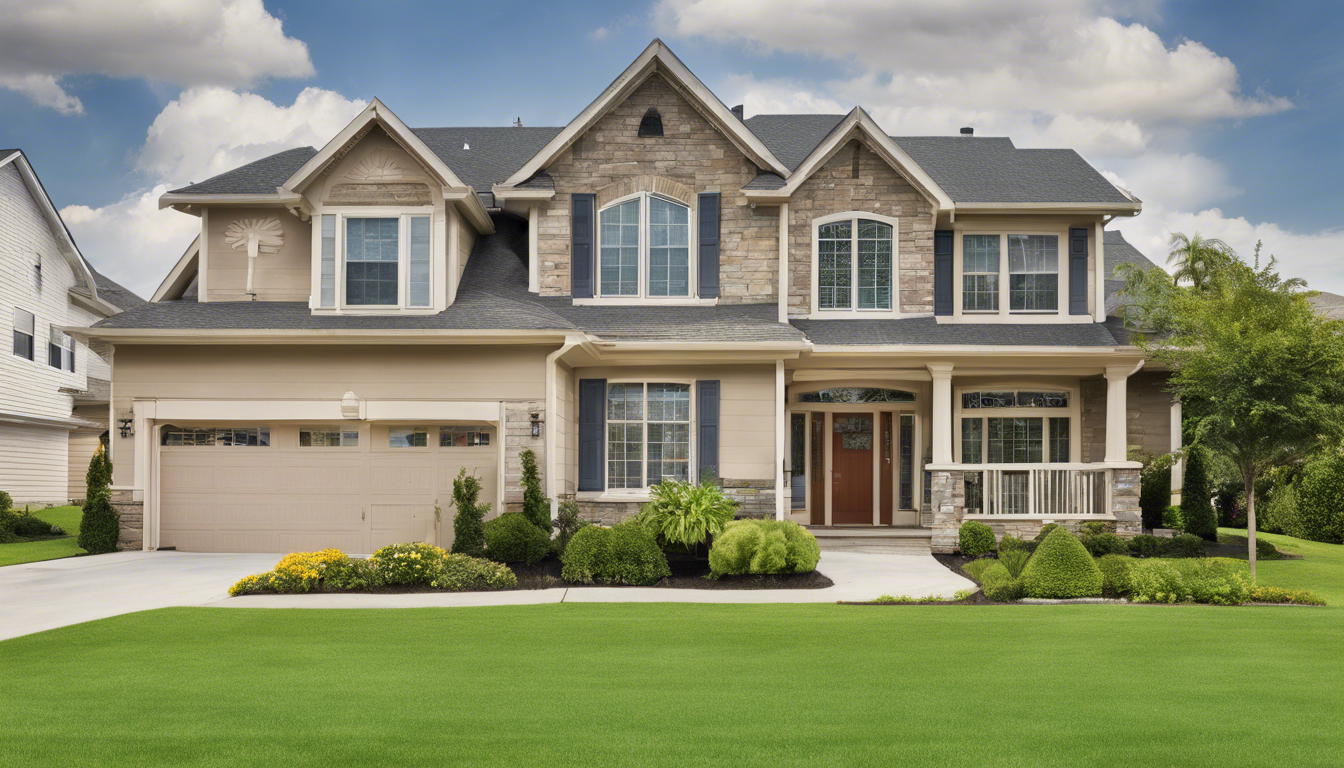Introduction to Homeowners Insurance
As a homeowner, safeguarding your most significant investment is of utmost importance. Homeowners insurance offers vital financial coverage to shield you from unexpected incidents, such as damage to your property caused by natural disasters or accidents.
Additionally, it provides essential liability protection, ensuring you are covered in case you are held responsible for injuries or accidents that happen on your property.
This comprehensive guide is designed to take you through all the essential aspects of homeowners insurance, providing you with the knowledge you need to make confident and informed decisions.
By understanding these key details, you’ll be better equipped to protect your home, safeguard your belongings, and ensure lasting peace of mind for you and your family.
What is an owner’s insurance coverage?

Homeowners insurance coverage is a specific type of property insurance designed to protect against various losses and damages to an individual’s residence, including the structure itself, furnishings, and other personal belongings within the home.
In addition to covering physical assets, it also provides crucial legal responsibility coverage for accidents or injuries that may occur either inside the residence or anywhere else on the surrounding property, ensuring comprehensive protection for homeowners.
Key Components of Homeowners Insurance
- Dwelling Coverage: Provides essential protection for the physical structure of your home, including its foundation, walls, roof, and built-in systems, ensuring that the primary construction of your property is safeguarded against covered damages.
- Personal Property Coverage: Protects your possessions located within your home, ensuring they are safeguarded against unexpected events or damages
- Liability Protection: Provides essential coverage to shield you from legal claims that arise due to personal injury, property damage, or harm caused to others in the course of your business operations
- Additional Living Expenses: Provides financial assistance to cover costs incurred when you’re temporarily unable to reside in your home due to an insured event or unexpected damage.
Types of Homeowners Insurance Policies
There are numerous types of homeowners insurance policies available, each offering a unique level of coverage and protection tailored to meet varying needs.
- HO-1: Basic kind (not often used immediately)
- HO-2: Broad form
- HO-3: Special kind (most typical)
- HO-5: Comprehensive kind
- HO-6: Condominium protection
- HO-7: Mobile house kind
- HO-8: Older house kind
The HO-3 coverage is widely regarded as the preferred option, offering an ideal balance of comprehensive protection, reliability, and cost-effectiveness, making it an excellent choice for the majority of homeowners seeking dependable insurance solutions.
What does an owner’s insurance coverage cover?
Standard householders insurance policies typically provide coverage for a wide range of essential needs, ensuring protection and peace of mind for homeowners:
- Damage to the Interior or Exterior of Your House: Provides essential coverage to safeguard your home from potential harm caused by fires, hurricanes, lightning strikes, acts of vandalism, or a variety of other covered disasters. This protection ensures that you can address unexpected damages and maintain the safety and integrity of your property.
- Loss or Damage to Personal Belongings: Protects items such as furniture, clothing, and various other personal possessions. This coverage extends to include belongings even when they are stored away from your primary residence or off-premises, ensuring comprehensive security for your valuables.
- Personal Liability for Damage or Injuries: This provides crucial protection against legal claims or lawsuits initiated by others due to accidents, damages, or injuries caused by you, members of your household, or even your pets. It ensures coverage for incidents where you or your family might be held responsible for harm or property damage, offering peace of mind and financial security in such situations.
- Hotel or House Rental While Your Home is Repaired: Commonly referred to as additional living expenses (ALE) coverage, this type of insurance provides financial assistance to cover temporary housing arrangements and related living costs while your primary residence undergoes necessary repairs or is deemed uninhabitable due to damage.
What Does Homeowners Insurance Not Insure?

Understanding what is typically excluded from standard insurance policies is crucial for making informed decisions:
- Floods
- Earthquakes
- Poor house upkeep
- Sewer backup
- Mold (normally)
- Valuable private property (which can require further protection)
For these specific exclusions, you might need to consider purchasing separate insurance policies or additional endorsements tailored to address these particular needs and provide the necessary coverage.
How Much Homeowners Insurance Do You Need?
Determining the appropriate amount of protection involves considering a variety of critical factors:
- The estimated value to rebuild your own home is: This should primarily reflect local construction costs and materials, rather than being influenced by the market value of your property or surrounding real estate pricing trends.
- The worth of your private belongings: Take the time to conduct a detailed and thorough house inventory to accurately evaluate your requirements and ensure nothing is overlooked.
- Your legal responsibility danger: Take a thorough look at your belongings, as well as any potential risks or hazards, to determine the appropriate amount of liability coverage that will adequately protect you in case of unforeseen events.
- Additional dwelling bills: Take the time to evaluate how long it might realistically take to rebuild your home from scratch and consider all the associated dwelling costs that could arise during the process.
Factors Affecting Homeowners Insurance Premiums
Several important factors can significantly influence the cost and terms of your insurance coverage rates, ultimately determining how much you pay and the type of protection you receive:
- Home’s age and building supplies
- Location and proximity to fireside stations
- Claims historical past
- Credit rating
- Deductible quantity
- Additional coverages
Tips to Lower Your Homeowners Insurance Costs
- Increase your deductible: Opting for a higher deductible typically results in a noticeable reduction in your monthly premiums, allowing you to save money over time while still maintaining coverage.
- Bundle insurance policies: Consider combining your house insurance and auto insurance under the same company to take advantage of potential discounts and cost savings.
- Improve house safety: Enhance your home’s security by installing smoke detectors in key areas, setting up reliable burglar alarm systems, and equipping all entry points with sturdy deadbolt locks to ensure maximum protection.
- Maintain good credit score: Having a strong credit score rating can significantly help you secure lower costs when it comes to your insurance coverage. By keeping your credit in good standing, you may benefit from reduced premiums and more favorable terms.
- Stay with the identical insurer. Many insurance companies offer loyalty discounts to their long-term customers as an incentive to remain with the same provider over the years. Maintaining your policy with the same insurer can often result in additional savings, as these companies value consistent and reliable clients.
- Review your coverage yearly. Take the time to carefully assess your current insurance plan to ensure that you are not spending money on coverage that is no longer necessary or relevant to your needs. By doing so, you can identify opportunities to save and make adjustments that better align with your current circumstances.
How to Choose the Right Homeowners Insurance Policy
- Assess your wants: Carefully evaluate the level of protection you need by considering the overall value of your home, as well as the importance and worth of your personal belongings. Take the time to thoroughly understand what coverage is necessary to ensure your property and possessions are adequately safeguarded.
- Compare quotes: Gather multiple estimates from various insurance providers to explore a wider range of options and identify the most competitive prices available.
- Conduct thorough research: Evaluate the insurer’s financial strength and customer service ratings.
- Understand the coverage: Take the time to thoroughly review and familiarize yourself with all the terms, conditions, and details, paying special attention to critical aspects such as coverage limits and exclusions to ensure clarity and avoid surprises.
- Consider further coverages: Take the time to assess if you need additional coverage options to address specific risks or to provide extra protection for valuable possessions. This may include specialized policies or endorsements designed to safeguard items of significant worth, ensuring comprehensive security and peace of mind.
Making a Claim on Your Homeowners Insurance

If you want to file a declaration:
- Contact your insurance coverage firm instantly
- Document the injury with photographs and movies
- Make momentary repairs to forestall additional injury
- Keep receipts for any bills associated with the injury
- Prepare an inventory of broken or misplaced objects
- Cooperate with the insurance adjuster during the claims process
The Future of Homeowners Insurance
The homeowners insurance industry is undergoing significant changes due to advancements in technology and the increasing impact of shifting local weather conditions, which continue to reshape the landscape of coverage and risk assessment for policyholders.
- Smart house know-how: Insurance companies are now offering substantial reductions for homes that are equipped with advanced smart gadgets. These modern devices are specifically designed to help prevent potential damage and deter theft, providing homeowners with both enhanced security and financial savings.
- Climate change concerns: Insurance companies are increasingly modifying their policies, coverage options, and premium rates to address the growing risks associated with more frequent and severe natural disasters, which are being exacerbated by the effects of climate change.
- Personalized insurance policies: Advanced data analytics technologies are making it possible to design highly customized coverage options that align closely with individual risk profiles and unique circumstances. This approach allows insurers to offer more precise and relevant solutions, catering to specific needs and preferences effectively.
Conclusion
Homeowners insurance serves as an essential safeguard for what is likely your most valuable asset. By gaining a thorough understanding of the types of coverage available, carefully evaluating your specific needs, and comparing policies to find the most suitable option, you can ensure that your home and personal possessions are fully protected. It’s also important to regularly review your insurance policy and make necessary updates or adjustments as your circumstances evolve, ensuring that you maintain the best possible coverage for your needs.
Internal Linking Opportunities:
- Link to an in-depth information on conducting a home inventory
- Link to an article explaining various kinds of natural disaster coverage
- Link to a calculator instrument for estimating rebuilding costs
External Sources:
- National Association of Insurance Commissioners (NAIC): https://content.naic.org/consumer/homeowners-insurance
- Insurance Information Institute: https://www.iii.org/article/what-covered-standard-homeowners-policy
- Federal Emergency Management Agency (FEMA): https://www.fema.gov/flood-insurance
- U.S. Department of Housing and Urban Development: https://www.hud.gov/program_offices/housing/sfh/ins/sfh_ins_homeowners
- Consumer Financial Protection Bureau: https://www.consumerfinance.gov/ask-cfpb/what-is-homeowners-insurance-what-does-it-cover-en-162/
Frequently Asked Questions (FAQ) About Homeowners Insurance
1. Is house owner’s insurance coverage required by regulation?
While homeowner’s insurance coverage may not be legally required in many regions, most mortgage lenders typically make it a mandatory condition for securing a mortgage. Even if you fully own your home without any outstanding loans, maintaining homeowner’s insurance is highly advisable to safeguard your valuable investment and ensure financial protection against unforeseen damages or losses.
2. How much householders insurance coverage do I want?
The amount of protection you need depends on several factors, including the cost of rebuilding your home, the value of your personal belongings and your liability risk. It’s highly recommended to ensure you have adequate coverage to fully rebuild your home and replace all your possessions in the event of a total loss, providing you with peace of mind and financial security.
3. What’s the distinction between precise money worth and alternative value protection?
Actual cash value (ACV) provides compensation based on the depreciated value of your possessions, reflecting their current market worth after accounting for wear and tear. On the other hand, alternative value protection offers reimbursement to replace your items with brand-new ones of similar quality, ensuring you can restore your belongings without financial strain. While replacement value coverage generally leads to higher insurance premiums, it delivers more comprehensive protection and peace of mind by covering the full cost of replacement.
4. Does the owner’s insurance coverage cover flooding?
Standard householders insurance policies generally do not provide coverage for damages caused by flooding. To ensure protection against flood-related risks, you will likely need to purchase a specialized flood insurance policy, which is often made available through the National Flood Insurance Program (NFIP), a federally-backed initiative designed to help homeowners manage the financial impacts of flood damage.
5. How can I decrease my homeowner’s insurance coverage premiums?
You can significantly lower your insurance premiums by opting to raise your deductible, combining multiple insurance policies under one provider, improving the safety features of your home, maintaining an excellent credit score, and remaining with the same insurance company over time to qualify for valuable loyalty discounts.
6. What is a house stock and why is it necessary?
A house stock is an in-depth listing of your possessions and their worth. It’s essential for guaranteeing you’ve sufficient private property protection and might be invaluable when submitting a claim, because it offers proof of ownership and helps you keep in mind all of your belongings.
7. Does injury from pets get covered by homeowner’s insurance coverage?
Most homeowners insurance policies typically include liability coverage to help protect against injuries or accidents caused by pets. However, specific breeds of dogs may not be covered under standard policies and could either be excluded entirely or necessitate the purchase of additional protection to ensure comprehensive coverage.
8. What is an insurance coverage rider, and when would I like one?
An insurance coverage rider, also known as an endorsement, is an additional provision added to your insurance policy that offers enhanced protection for specific items or risks that may not be fully covered under standard coverage.
These riders are particularly beneficial if you own high-value possessions, such as expensive jewelry, rare collectibles, or fine art, which may require extra protection beyond the limits of a typical policy. Additionally, they can provide coverage for unique or uncommon risks, like damage caused by earthquakes, which are often excluded from standard insurance plans.
9. How often ought I to evaluate my householders insurance coverage?
It’s incredibly beneficial to assess your insurance coverage annually or whenever you make significant changes to your home, like undertaking renovations or acquiring valuable new items. Taking this step helps guarantee that your level of protection remains adequate and aligns with your current circumstances, providing peace of mind and safeguarding your assets effectively.
10. What components could cause my homeowner’s insurance coverage charges to extend?
Factors that could potentially increase your charges include filing multiple insurance claims, experiencing changes in your credit score, completing home renovations that significantly raise the value of your property, and external influences such as heightened risks of natural disasters in your region.
Additionally, updates to your home, while adding value, may also lead to higher premiums as the cost to rebuild or repair increases. Environmental shifts or changes in local conditions, such as higher probabilities of floods, hurricanes, or wildfires, may further contribute to adjustments in your rates.
11. Does homeowners insurance coverage cover home-based companies?
Standard homeowner policies often include only minimal coverage for home-based businesses, leaving many entrepreneurs underinsured. If you operate a business from your home, it’s important to consider purchasing additional coverage or investing in a specialized enterprise insurance policy to ensure your operations and assets are fully protected.
12. How lengthy does it take to course of a householders insurance coverage declare?
The time required to resolve a claim can vary significantly depending on the complexity of the injury or incident and the responsiveness of your insurance provider. Straightforward claims are often resolved within just a few days, offering a quick and hassle-free experience.
However, more intricate or detailed claims may require additional investigation and documentation, potentially extending the process to several weeks or even months. To get a clear understanding of what to expect, it’s always advisable to check with your specific insurer regarding their typical claim processing times and procedures.

